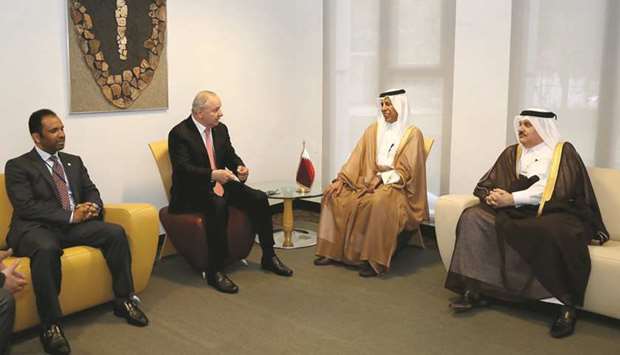HE the Advisory Council Speaker Ahmed bin Abdullah bin Zaid al-Mahmoud has lauded the position of the Latin American and Caribbean Parliament (LACP) on the unjust blockade imposed on Qatar, their understanding of Qatar’s stance and their rejection of the siege.
Delivering a speech before the 35th General Assembly of the Latin American and Caribbean Parliament (LACP),
HE al-Mahmoud said that since 5 June, 2017, Qatar has been subjected to unjust illegal blockade as well as unilateral measures taken by three neighbouring Gulf states — Saudi Arabia, UAE and Bahrain — in addition to Egypt, on the bases of false pretexts.
It all began with hacking the website of Qatar News Agency and publishing a fake statement attributed to His Highness the Amir Sheikh Tamim bin Hamad al-Thani, followed by false allegations and accusations that Qatar supports terrorism and then making 13 demands, considered by Qatar and many countries as unacceptable for violating its sovereignty.
He added that the Saudi-led quartet took a series of unilateral measures to impose air, land and sea blockade; severed all diplomatic and commercial relations; and imposed restrictions against citizens and residents of Qatar in violation of human rights.
These measures have been condemned by all human rights bodies as well as the International Court of Justice, which has recently issued an order rejecting the request of the United Arab Emirates (UAE) for provisional measures against Qatar in a case relating to the UAE’s unlawful discriminatory treatment of Qatar and the Qatari people.
HE al-Mahmoud said: “With God’s grace and then with the wisdom of our leadership, the State of Qatar has overcome the effects and repercussions of these measures,” adding that the “painful part is the blockade’s negative impact on Qatar’s as well as Gulf state’s citizens.” In this regard, he lauded the position of the LACP and its understanding of Qatar’s stance and its rejection of the blockade.
HE al-Mahmoud also reiterated Qatar’s keenness to actively contribute to the international community’s efforts to maintain international peace and security, pointing out that Qatar is a major donor to the United Nations in this regard.
He said Qatar actively participates and co-operates with the UN bodies concerned with combating terrorism, especially the Security Council and the relevant committees.
He stressed Qatar’s assertion that the root causes of terrorism must be addressed and that it should not be linked to any religion, thought or civilisation, taking into account the right of peoples to self-determination.
HE al-Mahmoud said that Qatar has attached great importance to the mediation for conflict resolution; made sincere efforts to achieve peace and development in many areas of conflict and has achieved important successes in this regard.
He also pointed out that Qatar has launched several humanitarian initiatives at the international level, such as the Protect Education in Insecurity and Conflict (PEIC); Reach Out To Asia (Rota); Silatech (an initiative that provides employment and employment opportunities for young people throughout the Arab world) and Educate A Child (a global initiative aimed at reducing the number of children who have lost their right to education).
He noted that Qatar has made significant economic and development strides, thanks to its integrated economic system, its huge potential and wise investment vision, in addition to being the world largest producer and exporter of liquefied natural gas (LNG) with 32% of the world’s gas production.
For all these achievements, Qatar has enjoyed the global trust that qualified it to have the honour of hosting the IPU conference two months ago in Doha, in which LACP has positively participated, and also the honour of hosting the FIFA World Cup in 2022 as the first Middle Eastern country to hold this important international event.
HE al-Mahmoud also stressed that the Advisory Council in Qatar is making parallel efforts with various state agencies to strengthen relations with all parliamentary systems in order to unify the efforts for the rule of law; international security and peace; and human dignity and rights protection, based by the belief that its peace and stability are an integral part of international peace and security.

HE al-Mahmoud with the President of the Latin American and Caribbean Parliament Elias Castillo.
